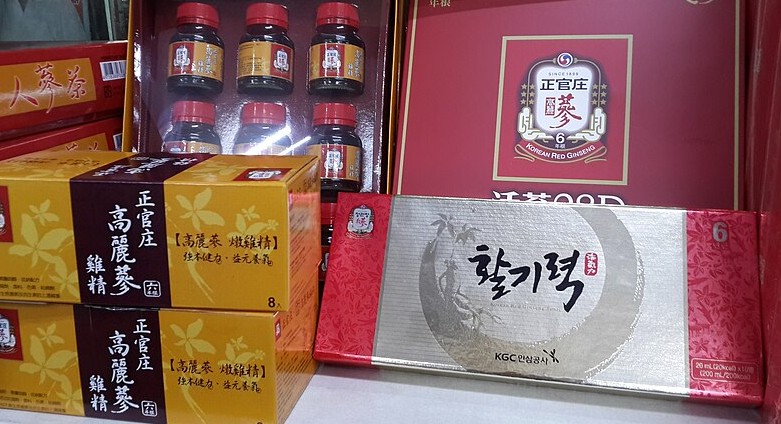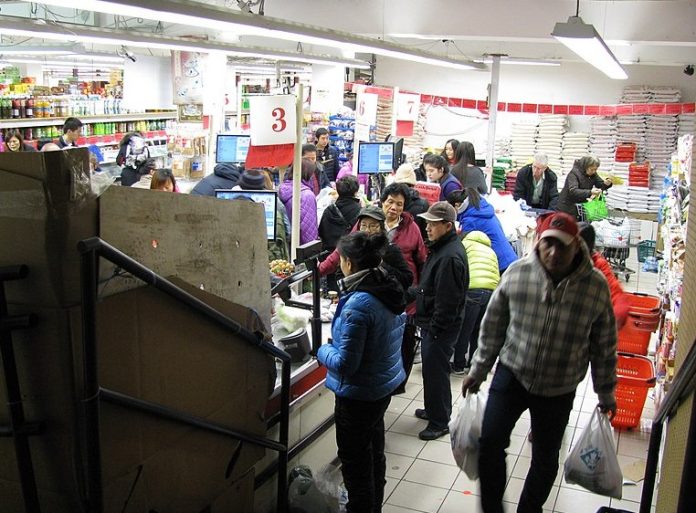By Randall Yip, Executive Editor
The Takeaways
- Impact on Asian American consumers and businesses: Asian American shoppers fear rising prices for cultural goods like tea, rice, and ginseng, while small businesses, especially those reliant on affordable imports, struggle to absorb higher costs.
- Economic repercussions: The tariffs have led to significant stock market declines, with the Dow Jones dropping 4.8% and the Nasdaq falling 6%, reflecting investor concerns over inflation and weakening economic growth.
- Political and international strain: Critics, including Rep. Grace Meng and Rep. Raja Krishnamoorthi, highlight the strain on Asian Americans and U.S.-Asian relations. Both question the effectiveness of the tariffs in achieving their intended goals.
The Details:
Asian American shoppers with a preference for cultural foods and products from Asian countries are expressing fears about the impacts of the recently announced tariffs by President Trump.
Those tariffs hit Asian countries especially hard- ranging from a low of 18% in the Philippines to 46% in Vietnam and 49% in Cambodia.
Rep Grace Meng (D-NY), chair of the Congressional Asian Pacific American Caucus, says several weeks ago she began hearing from AAPI small businesses expressing concerns.
Now that the tariffs have been announced, there’s been an uptick of concern from Asian American consumers.
“You know, we’re getting outreach from folks who are usually not that politically engaged. I think after today when they get a sense of how poorly the stock markets are doing, they’re going to reach out even more,” Meng said during a phone interview with AsAmNews.
The Dow Jones 30 Industrials fell 4.8% Thursday, April 3, to close down 1679 points. The Nasdaq plummeted 6%. Analysts say investors are reacting to the Trump tariffs and the prospect of weakening economic growth and inflation fears.
Trump says the tariffs will bring manufacturing and jobs back to the U.S. and level the playing field against trading partners who he says are taking advantage of the U.S. He also thinks it will encourage Americans to buy American products.
AAPI small businesses are not convinced that will happen.
The National Asian Pacific Islander American Chamber of Commerce and Entrepreneurship says it represents 3 million AAPI small business owners with chapters and partners in 130 areas of the country.
It held a roundtable in Silicon Valley just last week, one of several it held around the country.
“We understand and acknowledge the Trump administration’s effort to strengthen American industry and promote fair trade,” said Chiling Tong, President and CEO of National ACE, to AsAmNews. “We also recognize the challenges of those tariffs on small businesses. I think this high cost can particularly affect entrepreneurs who depend on affordable imports.”
She says it will be difficult for these businesses to absorb the higher costs. How they respond to the tariffs remains an open question.
Numerous Asian countries are seeing sharp spike in tariffs including Japan and Malaysia, 24%; South Korea, 26%; India, 27%; Pakistan, 30%; Indonesia and Taiwan, 32%, China, 34%; Thailand and Bangladesh, 37% and Sri Lanka, 44%.

Meng says she’s already heard the price of ginseng has increased up to 20 dollars a pound.
“Certain prices of goods that they (shoppers) rely on from tea to rice to cultural goods, those prices are going to go up. “They’re concerned because their families consume these products, and they oftentimes can’t afford to pay more.”
Rep Judy Chu (D-CA) agrees.
“Millions of Asian American families who buy everyday groceries from Asian countries will see prices skyrocket,” in a statement emailed exclusively to AsAmNews. “And since many Asian Americans buy imported specialty goods from small, family-owned grocery stores, we will not only see these families pay more just to put food on the table for their families, but we could see small businesses close their doors and employees lose their jobs.”
Of course, Asian American consumers don’t just purchase Asian products. They are as impacted as all Americans to a projected steep price hikes for cars to electronics to food at the grocery store.
Tong of National ACE also says she’s heard from AI startups in Silicon Valley which also fear the burden of the increased tariffs.
“They need to struggle to secure a loan and because of all these things happening, they don’t have a cash,” she said.
Despite that she believes those Asian Americans who voted for Trump in November remain optimistic and believe he is leading the country in the right direction. She says her organization remains open to having dialogue with both sides of the political aisle.
Rep Raja Krishnamoorthi (D-IL) today called the 27% tariffs on India damaging to U.S.-India relations and urged Trump to rescind it.
“At a time when our partnership with India is more crucial than ever to our shared prosperity and coordinated efforts to counter the military aggression and economic coercion of the Chinese Communist Party (CCP), these tariffs place an unnecessary strain on our relationship with the world’s largest democracy.” he said in a statement.
(We used AI to come up with the takeaways and published them only after being reviewed for accuracy).
Support our June Membership Drive and receive member-only benefits. With less than four days left in our fundraising drive, we are running out of time. We are just 51% of our goal of $10,000 in new donations and monthly and annual donation pledges and 44% of our goal of gaining 25 new recurring donors by the end of the month. We need your help during these challenging times. Please help to ensure quality content in amplifying the voices of the AAPI community.
We are published by the non-profit Asian American Media Inc and supported by our readers along with the Robert Wood Johnson Foundation, AARP, Report for America/GroundTruth Project & Koo and Patricia Yuen of the Yuen Foundation.
You can make your tax-deductible donations here via credit card, debit card, Apple Pay, Google Pay, PayPal and Venmo. Stock donations and donations via DAFs are also welcomed. Contact us at info @ asamnews dot com for more info.




